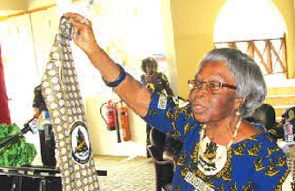It is unfortunate that the government has been silent on the cry and pains of pensioners who are unable to access their coupons and locked-up funds in the Domestic Exchange Program. This situation is unacceptable, and the government must take immediate action to address it.
Ghana's pensioners are individuals who have retired from various sectors of the economy, including public service, private sector, and informal economy. These individuals have made significant contributions to the country's development through their years of service and work.
Pensioners who served in the public sector contributed to the development of Ghana through their roles in various government institutions, such as education, health, and infrastructure. They played vital roles in the implementation of policies and programs aimed at improving the standard of living of Ghanaians. Additionally, they provided essential services to the people of Ghana and helped build the country's human capital.
Pensioners from the private sector have also contributed significantly to the development of Ghana's economy. They have played key roles in various industries, including agriculture, manufacturing, finance, and commerce. Through their work, they created job opportunities for Ghanaians, supported economic growth, and generated revenue for the country.
Even pensioners from the informal sector, though often overlooked, have contributed to the development of Ghana's economy. They have operated small and medium-sized businesses that have provided goods and services to local communities and supported economic activity at the grassroots level.
The pensioners who are picketing at the Security and Exchange Commission in Ghana are protesting against the government's failure to pay their pension funds, which have been locked up in the collapsed fund management companies.
The government had promised to release the funds to the pensioners, but so far, it has not fulfilled this promise, causing significant financial hardship and emotional distress to the affected pensioners. The picketing is meant to draw attention to the situation and put pressure on the government to take immediate action to release the funds to the pensioners.
Neglecting the cry of pensioners and denying them access to their pension funds can be considered a violation of their human rights. Pensioners have the right to access their retirement benefits, and any action or inaction that prevents them from doing so can be seen as a breach of their rights.
To seek justice, pensioners should engage with human rights organisations and seek legal redress. They should file a complaint with the appropriate authorities or seek the services of lawyers and human rights advocates who can represent them in court. Additionally, they can organise and advocate for their rights and make their voices heard by the government and the public. Through advocacy, pensioners can raise awareness about their situation and put pressure on the government to take action to address their grievances.
The National Pensions Regulatory Authority (NPRA) is the statutory body mandated to regulate and supervise Ghana's pension industry. In addressing the issue of pensioners' locked-up funds, the NPRA has a critical role to play in ensuring that the rights of pensioners are protected, and they have access to their funds.
The NPRA should engage with the government and other relevant stakeholders to advocate for the release of the funds and ensure that pensioners receive their benefits. They should also work with the fund management companies to facilitate the process of releasing the funds to the pensioners.
Furthermore, the NPRA can enforce the regulations that govern the pension industry to ensure that such situations do not occur in the future. They can review and strengthen the regulatory framework to protect pensioners' rights and safeguard their funds.
I call on the teaming youth and working class in Ghana to support pensioners to access their locked up funds and avoid similar situations in the future.
Firstly, The youth and working class should create awareness about the situation and put pressure on the government to take action. They should use social media, rallies, and demonstrations to raise awareness about the plight of the pensioners.
Secondly, the youth and working class should advocate for policy changes that will protect pensioners' rights and prevent similar situations from occurring in the future. They should engage with policymakers and legislators to ensure that policies are in place to safeguard pensioners' funds are secure and accessible when needed.
Also, the youth should join advocacy groups that are already working to support pensioners' rights and provide them with assistance. We must provide information on how to access legal redress.
Finally, We the youth and young working class in Ghana should learn from the experiences of the pensioners and plan for our retirement. We must ensure that we have adequate savings and investments to sustain ourselves and family / defendants in old age and reduce the reliance on government pension schemes.
The way forward is for the government to be more responsible, transparent and accountable in its dealings with pensioners. The government should totally exclude pensioners from the DDEP and provide regular updates on the progress of the Domestic Exchange Program and communicate clearly to pensioners on how they can access their funds. The government should ensure that the process for accessing these funds is not unduly cumbersome and is designed to protect the interests of pensioners.
Opinions of Tuesday, 16 May 2023
Columnist: Amb. Henry OSABUTEY
Government’s neglect and needless silence on pensioners - lesson for the youth
Entertainment














